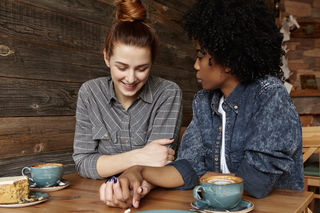Gender
Why Do Straight People Hook Up With Same-Gender Partners?
People who identify as straight may be more sexually fluid than once thought.
Posted August 28, 2018 Reviewed by Jessica Schrader

In recent years, there has been a growing trend for sexuality to be seen as a spectrum rather than as a collection of discrete identities, such as straight, gay, lesbian, or bisexual. The idea that sexual identity can be fluid—changing over time — has also caught hold. Many people now choose to adopt a broad identity, such as queer, rather than pin themselves down to a specific group.
Of course, straight is the majority identity, adopted by those who prefer partners whose gender doesn’t match their own. In a world where sexuality can be all the colors of the rainbow, and where gender identity is flexible, the label “straight” can seem, well, concrete. Everyone knows what it is. Everyone knows what it means.
New research, however, suggests that the truth is somewhat different.
Desire and behavior are not the same as identity. A person can identify as straight, but still desire or engage in sexual contact with persons of the same gender.
Arielle Kuperberg of The University of North Carolina and Alicia Walker of Missouri State University decided to investigate the experiences of college students who identified as straight, but whose most recent sexual encounter was with a person of the same gender. How many straight students hook up with a same-gender partner? If they really feel they’re straight, how can we explain these encounters?
The scientists analyzed data collected as part of the Online College Social Life Survey (2005–2011), which includes the responses of over 24,000 American students. Of those, around 800 reported that their most recent hook-up partner was the same gender. Volunteers also reported their sexual orientation: 12 percent of those who had engaged in male-male hook-ups and 25 percent of those who had engaged in female-female hook-ups identified as straight.
The volunteers answered other questions about the hook-up and about their lives in general.
Kuperberg and Walker analyzed the data and concluded that there were six “classes” or types of person who identified as straight, but whose most recent hookup was with a same-sex partner.
"Drunk and Curious"?
The largest group (29 percent) reported enjoying the encounter, and were the most likely to have experienced previous same-gender hook-ups. More than half wanted to enter in a longer-term relationship with their partner. Therefore Kuperberg and Walker call this class “wanting more.”
The second largest group (22 percent) was most likely to have never previously met their partner. They tended to be socially liberal, and over 70 percent reported binge drinking prior to the encounter. This class, which was split on whether they had enjoyed the hook-up, was labeled “drunk and curious.”
The third largest group (21 percent) included only women. Almost all of these encounters took place in public, and none included genital contact. The members of this group were the most likely to have been drinking before the encounter, and were unlikely to desire future same-gender relationships. Kuperberg and Walker call this class “maybe for show,” because they believe these women could be enacting a “social script” that encourages performative bisexuality for the arousal of male peers.
The next class was labeled “loved it, but religious” and comprised of about 12 percent of the volunteers, almost all women. They were the people most likely to attend regular religious services, and over half reported that their religious views influenced their opinions about sex. However, members of this class were the most likely to report that they had enjoyed their same-gender hook-up and wanted to pursue it further.
The fifth group (9 percent) was labeled “little enjoyment”: three-fifths of the students in this group reported not enjoying the hook-up. Mostly politically centrist, the members of this class all knew their partners before the encounter, which was unlikely to have progressed beyond kissing.
The smallest class (7 percent) was labeled “just not who I can be.” Like the “loved it, but religious” class, the members of this class regularly attended services. However, almost all were male. Politically conservative, almost all members believed that same-gender sexual contact is wrong and reported enjoying the hook-up only moderately.
Varied Motivations
It’s important to note that the results of this study are unlikely to be representative of the general population. As the researchers point out, the volunteers were all students, and the majority were enrolled in sociology courses with gender and sexuality components, perhaps leading to an over-representation of persons who are questioning their sexual identity.
The number of volunteers was also relatively small, especially when broken down into classes, although this is perhaps inevitable given that the most recent hook-up partner of the majority of heterosexually identifying persons will not have been of the same gender.
Nevertheless, this study does reveal the varied motivations and experiences of those who self-identify as straight, but engage in sexual behavior with persons of the same gender. Some are likely to be enacting social scripts and conforming to expected behavior.
Others are likely to be exploring their sexuality and are either unwilling to adjust their identity to match their behavior, or feel that their behavior does not fit within their identity.
It is especially interesting to see that the effect of religion appears to be gendered, with religious men less likely to report enjoying their same-gender hook-up than religious women.
Exploding Myths
Kuperberg and Walker were also able to challenge several myths. For example, it has been suggested that Black men are more likely to identify as straight, but secretly hook up with other men, and research has often focused on this group. This new study reveals that, at least among these college students, White men are more likely than Black or Asian men to combine a straight identity with same-gender hook-ups.
Also, some researchers have suggested that fraternity hazing or sexual coercion might be associated with same-sex encounters among heterosexually identifying students, but this did not appear to be the case.
It is also clear that the majority of these students are unlikely to be “closeted” or secretly gay: Some will no doubt transition to a gay, lesbian, or bisexual identity, but others will continue to identify as straight.
Further research that tracks college students as they move into the next phase of their lives is likely to be revealing, as are follow-up studies of today’s cohort of college students, many of whom have grown up in a world where same-gender relationships are increasingly acceptable.
References
Kuperberg, A., & Walker, A. (2018). Heterosexual college students who hookup with same-sex partners. Archives of Sexual Behavior, 47(5), 1387–1403. doi:10.1007/s10508–018–1194–7




